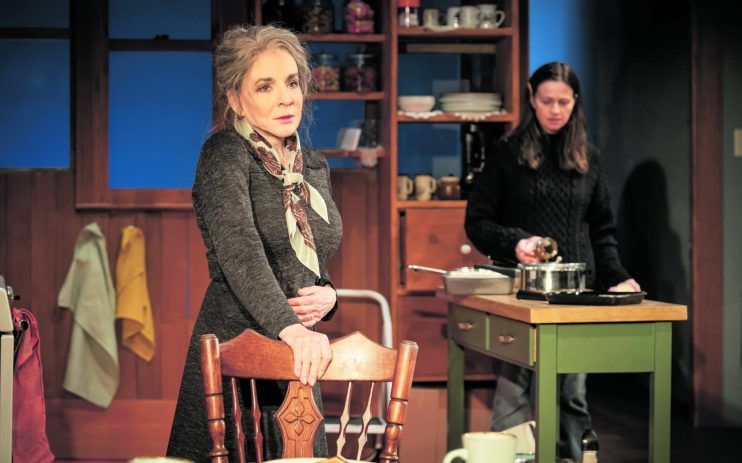‘night, Mother at Hampstead Theatre, review: Misses the mark

You know there’s a problem when you realise, half way through a play’s performance, that you don’t care what happens to either of the protagonists.
On paper, ‘night, Mother at the Hampstead theatre seemed a recipe for success: a revival of Marsha Norman’s 1985 Pulitzer-winning play starring stage and screen icon Stockard Channing (Grease, Six Degrees of Separation) and the rising Rebecca Night (Prism). But there’s something stilted about the production, which lacks the energy a play of such sombre themes – suicide, incurable illnesses, isolation – requires.
‘night, Mother opens onto a scene familiar to many: a gentle tiff between a mother, Thelma, and her grown-up daughter, Jessie, who have spent a little too much time in each other’s company. Conversation ricochets pleasantly between the two women as they tidy the house, sorting candy into jars and musing about life over cups of hot chocolate. But don’t be misled by homely appearances; beneath the thin lacquer of domestic charm are scars waiting to be revealed, and a pistol ready to be fired.
The audience quickly pieces together their situation: the epilepsy that has dogged much of Jessie’s life and prevented her from having a career; the heartbreaks, regrets, and petty grievances that make up the fabric of most lives and which, when brought to extremes, become too much to live with. “I’m going to kill myself, mama”, Jessie announces to her mother in the first ten minutes, cleaning her late father’s gun and charging it with bullets. The audience gets a nasty feeling she means what she says.
Theirs is a rural homestead somewhere in the Midwest, the cosiness offset by the isolation. In the programme we’re informed that “rural areas have higher mortality rates, including higher rates of death from suicide and other ‘deaths of despair’”. Despair is certainly thick in ‘night, Mother, and much can also be redirected at the play itself, which gives too much away too soon, at the expense of dramatic tension. The set, designed by Ti Green, is dynamic enough and expertly dowdy, the actors wandering in and out of the pantry, the rustic kitchen island rapidly becoming the epicentre of their spats to the point that I began to wonder, and somewhat hoped, it would later turn into a coffin.
As well as a portrait of the psychological effects of loneliness, part of the play’s intention was to tackle the stigma surrounding epilepsy, which was prevalent in the 1980s. We sense Jessie’s pain, and are invited to understand, on some level at least, the circumstances that have led her to the frightening logic of this moment. But this sheer pessimism pervades the show throughout, and with nothing in the way of catharsis it lurches into irredeemable dreariness, Jessie’s monologues are stripped of their punch.
Could it be that the play is just out of date? Staged as part of Hampstead’s Originals season, in honour of the Theatre’s 60th birthday, ‘night Mother joins a revival of plays that had their European premiere at the theatre. The 90 minutes felt like an eternity, the near-40-year-old script showing its age. The patina of speech now feels strangely antiquated; the funny lines were swallowed; and the ending laughably predictable. At times the emotions rang true, at others they felt half-remembered, with a delivery that at certain moments suggested a lack of familiarity with the text, although this could have been a consequence of the non-committal direction, which gave the evening the air of a rehearsal read-through.
There are redeeming elements. Night and Channing make a fine double act: Night as the tortured daughter, Channing as the doddery, at times well-meaning, at others infuriating, mother. Perhaps the weight of the subject matter led to a decision not to take risks in a time of trigger-warnings and heightened audience sensitivity. But it results in an infuriatingly bumbling piece of theatre that fails to provoke as it should.